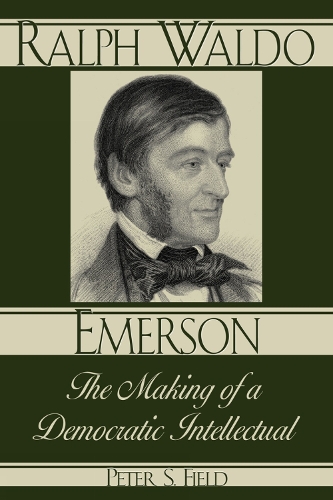
Ralph Waldo Emerson: The Making of a Democratic Intellectual
(Paperback)
Publishing Details
Ralph Waldo Emerson: The Making of a Democratic Intellectual
By (Author) Peter S. Field
Bloomsbury Publishing PLC
Rowman & Littlefield Publishers
9th October 2003
United States
Classifications
General
Non Fiction
Literary studies: c 1800 to c 1900
History of ideas
Literary studies: poetry and poets
818.309
Physical Properties
Paperback
272
Width 144mm, Height 222mm, Spine 15mm
327g
Description
Peter S. Field argues that Ralph Waldo Emerson was America's first democratic intellectual. Field contends that Emerson was a democrat in two senses: his writings are imbued with an optimistic, confident ethos; and, more importanty, he acted the part of the democrat by bringing culture to all Americans. Despite an intellectual inheritance grounded in federalist-unionist elitism, Emerson embraced American democracy. His energy and essential originality stemmed from his attempt to apply his high cultural education to an increasingly egalitarian society. Field connects Emerson and his remarkable creativity to the key political issue of the day: the nature of democracy and the role of intellectuals within a democratic society.
Reviews
Field's book is a welcome addition to the literature that examines Emerson as a product of his times and explores how, throughout his life, he attempted to situate himself as a spokesman for a particular issue or issues. . . . Field has produced an excellent, suggestive evaluation of the public Emersonthe one who continually refashioned himself as his ideas and venues changedand a book that deserves to be placed among the best studies of Emerson's intellectual and professional development. -- Joel Myerson * New England Quarterly *
Field stands atop the current reassessment of Ralph Waldo Emerson's public voice with his fresh sense of all the relevant texts and contexts, from origins in the Boston ministry through national politics of the Civil War era. This book makes an admirable case for nineteenth-century America's most influential thinker. -- Phyllis Cole, Penn State University, Delaware County
Field does a convincing job of showing the growth of this public thinker, and his volume certainly adds to our understanding of the man and his times. -- Susan L. Roberson * H-Shear *
None of Ralph Waldo Emerson's accomplishments was more important than his reinvention of himself. Peter S. Field persuasively traces Emerson's transformation from Unitarian minister to public intellectual in this able biography of one of the 19th century's most enduring figures. -- Conrad Edick Wright, Massachusetts Historical Society
As a brief for Emerson as a public intellectual, Field's book is valuable and has the virtue of offering readers a focused examination of the ways in which, from the years of his first ministry on, this seminal thinker understood that the age demanded a new kind of cultural critic. -- Philip F. Gura * Reviews in American History *
Peter Field's new study of Emerson portrays him in very human and compelling terms, searching for his self, finding his voice and vocation, and becoming America's prototypical 'public intellectual.' Emerson springs to life in its pages, engaged with the challenges facing his age. A wonderful introduction to the Sage of Concord. -- John F. Wilson, Princeton University
A sharply-etched portrait of America's first public intellectual and his search for a vocation. -- John L. Thomas, Brown University
It is often saidand the claim is supported persuasively in Peter Field's fine studythat Emerson was America's first 'public intellectual.' But Field goes further than that, seeing in Emerson an especially prophetic exponent of the possibilities of democracy itself, a lone voice attributing American intellectuals' famous 'alienation from the crowd' not to the insufficiencies of the American people and the doleful effects of 'democratic leveling' but to the failures of the thinking class itself. * The Weekly Standard *
Author Bio
Peter S. Field teaches history at the University of Canterbury in Christchurch, New Zealand. He is the author of The Crisis of the Standing Order: Clerical Intellectuals and Cultural Authority in Massachusetts, 1780-1833 and coauthor of The Promise and Paradox of American Freedom. He has previously taught at Columbia University and Vanderbilt University, and in 1998-99 he was a fellow at the Center for the Study of Religion at Princeton University.
